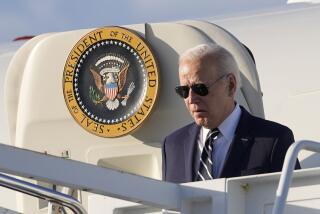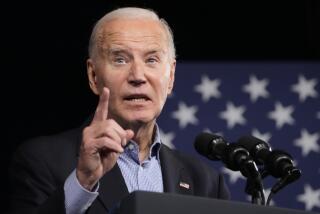Obama: ‘I don’t think we’re losing’ the fight against Islamic State
President Obama said he doesn’t think the U.S. is faltering in its fight against Islamic State militants in Iraq and Syria, dismissing recent losses as a setback in what he knew would be a long fight and seeking to put the onus on Iraqi Prime Minister Haider Abadi to better train his own military for the battle.
The fall of Ramadi in Anbar province is a “tactical setback” for an Iraqi city that had been vulnerable because of a lack of trained and reinforced Iraqi security forces, Obama said in an interview published Thursday.
“They have been there essentially for a year without sufficient reinforcements, and the number of ISIL that have come into the city now are relatively small compared to what happened in [the Iraqi city of] Mosul,” Obama said, referring to the Islamic State’s takeover last summer of Iraq’s second-biggest city. “But it is indicative that the training of Iraqi security forces, the fortifications, the command-and-control systems are not happening fast enough in Anbar, in the Sunni parts of the country.
“I don’t think we’re losing,” Obama said.
Obama defended his strategy in the interview with Jeffrey Goldberg of the Atlantic magazine, which took place on Tuesday, after Ramadi fell but a day before Islamic State took the Syrian city of Palmyra.
The successive victories for the militant group raised new questions about the president’s strategy of staying out of the fight except to help build the capacity of locals to wage it.
Obama acknowledged the need for more training of Iraqi troops and increased involvement from Sunni tribes.
“Prime Minister Abadi recognizes many of these problems, but they’re going to have to be addressed,” he said.
House Speaker John Boehner (R-Ohio) called on Obama on Thursday to scrap his strategy and offer a new “overarching” one, which he suggested should be driven more by military commanders.
“Instead of placing artificial constraints on our commanders, it’s critical that we have a strategy that ensures that conditions on the ground dictate our approach,” Boehner told reporters, adding that the U.S. should “better engage in a meaningful way” with Islamic leaders addressing the factors that drive radicalization.
“And, any overarching strategy has to put a priority on backing – not ignoring – America’s allies in the region,” Boehner said.
Another Republican lawmaker, South Carolina Sen. Lindsey Graham, recently said he would send 10,000 American troops to fight Islamic State, which the White House was all too happy to address as an alternative to Obama’s policy.
“The president is not going to be in a position where he’s going to consider a large-scale U.S. military deployment,” White House Press Secretary Josh Earnest said Thursday. “And I don’t think that they will find either a lot of support on the part of the American people for a large-scale deployment of military resources to essentially re-invade Iraq or invade Syria.”
Earnest said Obama stands by his pledge not to send U.S. combat troops into the conflict.
But Republicans quickly pushed back against that idea, arguing that there are other options besides Obama’s policy and a large-scale ground war.
The White House is setting up a “false choice” between the president’s plan and one that would put more than 100,000 troops on the ground, said Cory Fritz, Boehner’s spokesman.
“No one is talking about re-invading,” said Fritz. “What we’re talking about is giving our commanders already on the ground the flexibility and the authority to take on ISIL and win.”
For news about President Obama and the Obama administration, follow me on Twitter: @cparsons
More to Read
Start your day right
Sign up for Essential California for news, features and recommendations from the L.A. Times and beyond in your inbox six days a week.
You may occasionally receive promotional content from the Los Angeles Times.







